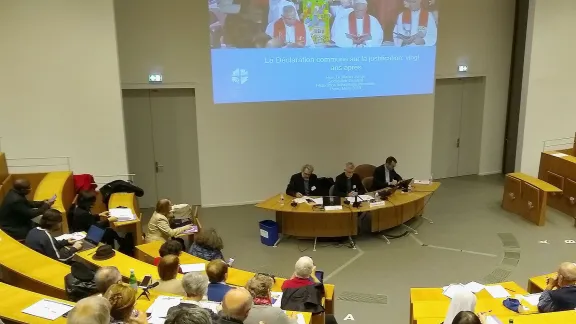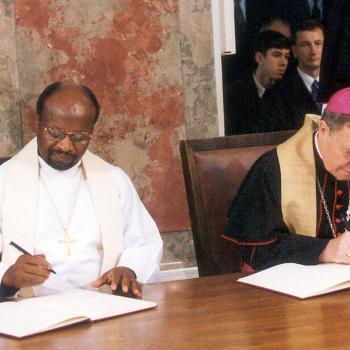
LWF Secretary General Rev Dr. Martin Junge speaking at a colloquium organized by the Institute of Advanced Ecumenical Studies of the Catholic University of Paris. Photo: Stephen Brown
LWF General Secretary reflects on JDDJ twenty years on
(LWI) - In a world of increased fragmentation and communications breakdown, the landmark Joint Declaration on the Doctrine of Justification (JDDJ) is a clear example of Christians coming together to show “what God is building up in our midst.”
Speaking on 12 March at a colloquium in Paris, jointly organized by the Orthodox, Protestant and Catholic theology faculties, The Lutheran World Federation (LWF) General Secretary Rev. Dr Martin Junge looked back to the signing of the declaration between Catholic and Lutheran leaders in Augsburg, Germany on 31 October 1999, Reformation Day. He explored the origins and the reception of the JDDJ, as well as the opportunities it offers for Christians of all denominations today.
He noted that the agreement, which effectively resolved the key theological issues of the Reformation conflict, grew out of the “steady ecumenical engagement of individuals, communities and churches” that were deeply committed to the search for unity long before the official dialogues began to bear fruit.
Not only did the JDDJ show agreement between Lutherans and Catholics on the “basic truths” of salvation as a free gift from God, it also stated that the mutual condemnations pronounced at the time of the 16th century Reformation, do not apply to the teachings of the two communions today, Junge noted.
Furthermore, the JDDJ broke new ground by using the ‘differentiating consensus’ method, which allowed both sides to express differences without questioning the consensus, giving rise to the ‘receptive ecumenism’ model of engagement.
New horizons
Over the past 20 years, the LWF General Secretary continued, the declaration has led to some “unexpected and extraordinary milestones” and opened new horizons for both bilateral and multilateral dialogues.
At multilateral level, the World Methodist Council officially joined the JDDJ in 2006, adding its own statement on the theology of sanctification. More recently, in 2017, the World Communion of Reformed Churches joined the declaration, adding a statement on the link between justification and justice, while the Anglican Communion also stated its “adherence to the substance” of the JDDJ.
At bilateral level, Junge pointed to the insights gained from the Lutheran-Mennonite dialogue, which produced an important study on healing painful memories of the past. At its 2010 Assembly, a liturgical service of reconciliation allowed Lutherans to apologize and receive forgiveness for their persecution of Anabaptists, precursors of the Mennonite movement.
That service provided a model for Lutherans and Catholics seeking reconciliation at their historic encounter in Lund in 2016. Ecumenical partners, Rev. Junge said, learned that “understanding is best reached through dialogue” but healing can only take place by “daring to tell our stories, listening, crying together, forgiving and reconciling”, preferably in a shared liturgical setting.
The General Secretary then looked back at the lengthy preparation period for the Joint Catholic-Lutheran Commemoration of the Reformation, which culminated in Pope Francis presiding together with former LWF President Bishop Dr Munib A. Younan and General Secretary Junge at an ecumenical liturgy in Lund, Sweden.
“We remain deeply grateful for the courageous, powerful decision of Pope Francis to personally participate in the Joint Commemoration”, Junge said, adding that it was a “logical and coherent” follow up to the important steps taken by previous pontiffs since Pope John XXIII called the Second Vatican Council.
The Lund commemoration sent “a strong public message in advance” of the 500th anniversary the following year, leading churches in all regions of the world to hold hundreds of commemoration services using the Lund liturgy.
Junge stressed that none of these shared events, including the key document ‘From Conflict to Communion’ upon which they were based, would have happened without the JDDJ. He noted that a high-level consultation will take place at the University of Notre Dame in the United States at the end of March, with all five JDDJ signatories exploring further “possible implications for joint witness and unity”.
Ecumenical progress will only be achieved if it is built on trust,” as well as a commitment to continue “building bridges of reconciliation, theological understanding, healing of memories and service of the most needy – that the world may believe.
Still, there are “many questions and few certainties” as “we travel together the uncharted land ahead,” Junge said. Contemplating on the way ahead and explaining the concept of “pastoral ecumenism,” Junge noted “our theological discernment ought to be driven by the pastoral concern” for Catholics and Lutherans yet unable to share in Holy Communion.
The LWF leader ended his presentation by highlighting some of the upcoming 500th anniversaries, including the Diet of Worms in 2021. While they present many challenges and “sad memories”, he said, the LWF and the Pontifical Council for Promoting Christian Unity have agreed to develop a new resource offering a joint narrative that will help people read these historic events in light of contemporary relationships.
Junge concluded, “Ecumenical progress will only be achieved if it is built on trust,” as well as a commitment to continue “building bridges of reconciliation, theological understanding, healing of memories and service of the most needy – that the world may believe.”
The Joint Declaration on the Doctrine of Justification was the result of over three decades of ecumenical dialogue between the Lutheran World Federation and the Roman Catholic Church.
Related Event: 26 – 28 March 2019



